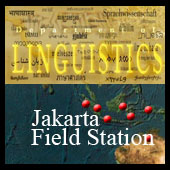| (The Former) Jakarta Field Station of the Max Planck Institute for Evolutionary Anthropology | |
 | |
| Data | |
| Projects | |
| Language Acquisition | |
| Bilingual Language Acquisition | |
| Language Contact | |
| Language Description | |
| Language Experiments | |
| Javanese Dialectology | |
| Metaphor and Emotion | |
| Collaborative Projects | |
| Documentation of Kenyah | |
| Figurative Language | |
| Language and Thought | |
| Phon. of Jakarta Indonesian | |
| Traditional Jambi Malay | |
| Moluccan [external link] | |
| Acquisition of Passive Voice | |
| Sociolinguistic Questionnaire | |
| Former Collaborative Projects | |
| Acq. of Morpho-phonology | |
| Publications & Conf. Papers | |
| News | |
| Regular Events | |
| Events | |
| The Jakarta Forum | |
| Contact Us | |
| People | |
| Site Map | |
| Links | |
| Impressum | |
Pemalangan Dialect (Pesisir Lor)
Pemalangan is a Javanese dialect spoken in Pemalang. This region is located at the northwestern shore of Central Java, neighbored by Tegal to the west and Pekalongan to the east. The dialects in these regions share much in common, and differ from other dialects of Javanese; namely the occurrence of glottal stop /ʔ/ in almost every utterance with a final vowel.
Ora ana [ɔra anaʔ]
NEG exist
I don't have it.
Aja turu [ʔaja turɔʔ]
Don't sleep
Don't sleep!
Pemalangan differs slightly from the other dialects in the west-northern shore of Central Java. Idiosyncratically, the speakers of the dialect pronounce schwa /ə/ replacing /a/, a typical vowel in the region. It is as seen in the table below.
| Other regional dialects | Pemalangan | |
| five | [limaʔ] | [liməʔ] |
| Holland/Dutch | [landaʔ] | [ləndəʔ] |
This vowel change shows that there is a process of centralization in Pemalangan, namely the change of /a/ an Open Front vowel into /ə/ a Mid Central vowel.
The structure of the phrase and clause in Pemalangan is not too much different from that of other Javanese dialects. However there are plenty of interesting facts and phenomena demanding to be studied. One of which I am interested in is the occurrence of the double negator ora that constitutes meaning 'both'. This example is found in the Pemalang data.
[Ora kakang-e ora adi-ne] neng Cina kabeh. NEG older.sibling.E NEG younger.sibling.E LOC Chinese all Both my older siblings and my younger siblings were in Chinese (= both my older siblings and my younger siblings worked for Chinese, all of them)
In Javanese ora functions to negate verbs, such as in;
Udin ora lunga maring pasar
Udin NEG leave to market
'Udin didn't go to the market'
Whereas for nouns and adjectives another negator is used, that is 'gudu';
sing dikei gudu dhuwit tapi buku
REL DI-give NEG money but book
'he gave me not money, but a book'.
Bukune warnane gudu ijo
Book-E color-E NEG green
'the color of the book is not green'
With regard to the two different types of negator, the double ora construction [ora X ora Y…] is peculiar because ora does occur with nouns instead of with verbs. Furthermore, the meaning of ora in the structure is not negative but positive functioning as a conjunction meaning 'both'. One may suspect that the distribution of 'ora' in the construction can be accounted for both under a diachronic and synchronic investigation.
Last modified: 22 Apr 2007, London, UK
Location: pemalangan.php.html